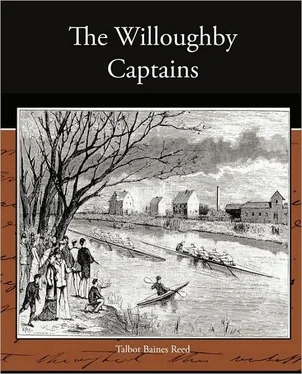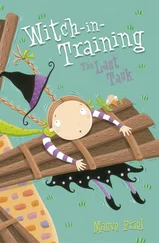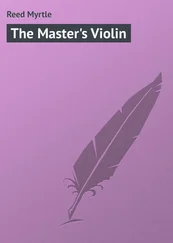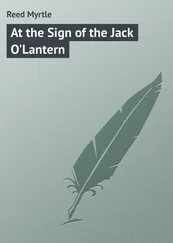“But Gilks and Silk are both monitors, aren’t they?”
“They are,” said the captain, with a touch of bitterness in his tone.
There was another pause, this time a long one. Neither boy seemed inclined to return to the subject. Wyndham opened his books and made a pretence of beginning his work, and Riddell fidgeted with the papers before him. In the mind of the latter a hurried debate was going on.
“What had I better do? I might send him up to the doctor and perhaps get him expelled. It might be the best thing for him too, for if those two have got hold of him he’s sure to go wrong. I can’t do anything to keep him from them. And yet, I promised old Wynd — I must try; I might help to keep him straight. God help me!”
Is the reader astonished that the captain of a great public school should so far forget himself as to utter a secret prayer in his own study about such a matter as the correction of a young scapegrace? It was an unusual thing to do, certainly; and probably if Wyndham had known what was passing in the captain’s mind he would have thought more poorly of his brother’s friend than he did. But I am not quite sure, reader, whether Riddell was committing such an absurdity as some persons might think; or whether you or I, or any other fellow in a similar position, would be any the worse for forgetting ourselves in the same way. What do you think? It is worth thinking over, when you have time.
“God help me,” said Riddell to himself, and he felt his mind wonderfully cleared already as he said it.
Clearer, that is, as to what he ought to do, but still rather embarrassed as to how to do it. But he meant to try.
“I say, Wyndham,” he said, in his quiet way. “I want to ask your advice.”
“What about?” asked Wyndham, looking up in surprise. “About those fellows?”
“Not exactly. It’s more about myself,” said the captain.
“What about you?” asked Wyndham.
“Why, there’s a fellow in the school I’m awfully anxious to do some good to,” began Riddell.
“Rather a common failing of yours,” said Wyndham.
“Wanting to do it is more common than doing it,” said Riddell; “but I don’t know how to tackle this fellow, Wyndham.”
“Who is he? Do I know him?” asked the boy.
“I’m not sure that you know him particularly well,” said the captain. “He’s not a bad fellow; in fact he has a lot of good in him.”
“Is he a Limpet?” asked Wyndham.
“But,” continued Riddell, not noticing the question, “he’s got a horrid fault. He won’t stand up for himself, Wyndham.”
“Oh,” observed Wyndham, “there’s a lot of them like that — regular cowards they are.”
“Exactly, this fellow’s one of them. He’s always funking it.”
Wyndham laughed.
“I know who you mean — Tedbury, isn’t it?”
“No, that’s not his name,” said Riddell. “He’s a nicer sort of fellow than Tedbury. There are one or two fellows that are always down on him, too. They see he’s no pluck, and so they think they can do what they like with him.”
“Meekins gets a good deal mauled about by some of the others,” said Wyndham.
“This fellow gets a good deal more damaged than Meekins,” said the captain. “In fact he gets so mauled his friends will soon hardly be able to recognise him.”
Wyndham looked sharply at the speaker. Riddell was quite grave and serious, and proceeded quietly, “The worst of it is, this fellow’s quite well able to stick up for himself if he likes, and could easily hold his own. Only he’s lazy, or else he likes getting damaged.”
“Are you making all this up?” demanded Wyndham colouring.
Riddell took no notice of the inquiry, but continued rather more earnestly, “Now I’d like your advice, Wyndham, old fellow. I want to do this fellow a good turn. Which do you suppose would be the best turn to do him; to pitch into the fellows that are always doing him harm? or to try to persuade him to stick up for himself and not let them do just what they like with him, eh?”
Wyndham had seen it all before the question was ended, and hung down his head in silence.
Riddell did not disturb him, but waited quietly, and, if truth be told, anxiously, till he should reply.
Presently the boy looked up with a troubled face, and said, “I know I’m an awful fool, Riddell.”
“But you’re not obliged to be,” said the captain, cheerily.
“I’ll try not to be, I really will,” said Wyndham. “Only—”
“Only what?” asked Riddell, after a pause.
“Only somehow I never think of it at the time.”
“I know,” said Riddell, kindly.
“Why only this afternoon,” said Wyndham, drawn out by the sympathy of his companion, “I tried to object to going down to the town, and they made up some excuse, so that I would have seemed like a regular prig to hold out, and so I went. I’m awfully sorry now. I know I’m a coward, Riddell; I ought to have stuck out.”
“I think you ought,” said Riddell; “they would probably have laughed at you, and possibly tried to bully you a bit. But you can take care of yourself, I fancy, when it comes to that, eh?”
“I can about the bullying,” said Wyndham.
“And so,” said Riddell, “you really advise me to say to this fellow I was telling you about, to stand up for himself and not let himself be led about by any one?”
“Except you, Riddell,” said the boy.
“No,” said Riddell, “not even me. I can’t profess to tell you all you ought to do.”
“I should like to know who can, if you can’t?” said Wyndham.
“I think we both know,” said Riddell, gravely.
The conversation ended here. For an hour and a half after that each boy was busy over his work, and neither spoke a word. Their thoughts may not all have been in the books before them; in fact it may safely be said they were not. But they were thoughts that did not require words. Only when Wyndham rose to go, and wished his friend good-night, Riddell indirectly referred to the subject of their talk.
“By the way, Wyndham, Isaacs has given up the school librarianship; I suppose you know. How would you like to take it?”
“What has a fellow got to do?” asked Wyndham.
“You have to issue the new books every Monday and collect the old ones every Saturday. There are about one hundred boys subscribe, and they order the new book when they give up the old, so it’s simple enough.”
“Takes a lot of time, doesn’t it?” said Wyndham.
“No, not very much, I believe. Isaacs shirked it a good deal, and you’d have to keep the lists rather better than he did. But I fancy you’d enjoy it rather; and,” he added, “it will be an excuse for seeing less of some not very nice friends.”
Wyndham said he would take the post, and went off happier in his own mind than he had been for a long time, and leaving Riddell happier too, despite all his failures and vexations elsewhere, than he had been since he became captain of Willoughby.
But, though happy, he could hardly be elated. His effort that evening had certainly been a success, but how long would its effects last?
Riddell was not fool enough to imagine that his promise to old Wyndham was now discharged by that one evening’s talk. He knew the boy well enough to be sure that the task was only just begun. And his thankfulness at having made a beginning was tempered with many anxieties for the future. And he might well be anxious!
For a day or two Wyndham was an altered boy. He surprised his masters by his attention in class, and his schoolfellows — all except Riddell — by the steadiness of his behaviour. He avoided his former companions, and devoted himself with enthusiasm to his new duties as librarian, to which the doctor, at Riddell’s suggestion, had appointed him.
Читать дальше












